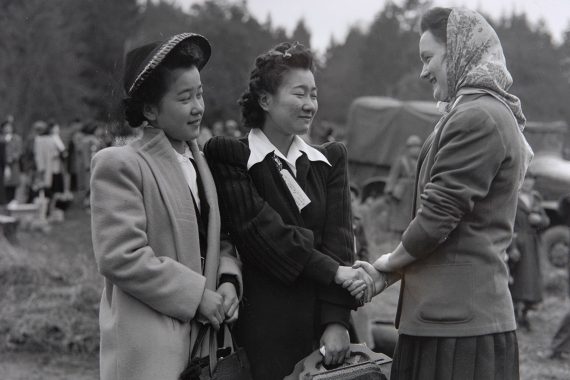Another dear part of the Bainbridge Island Family has left us. Former Bainbridge Islander Ritsuko Terayama Hamamura, passed away on December 16th from Covid-19. Her passing, at the age of 100, follows that of her brother Kayo, who left us earlier this year.
Obituary
Cherished mother, grandmother, sister, aunt and friend, Ritsuko Hamamura passed away on December 16, 2020, from Covid-19 at the age of 100. She was born June 26, 1920, in Seattle to immigrant parents, Otozo Terayama and his “picture bride,” Yoneko, who sailed to the US from Hiroshima, Japan, seeking a better life.Strength, Resilience, Hard work, Gratitude, Independence, Positivity, Friendship, Kindness, and Love are themes that characterize Ritsuko’s long life.
Ritsuko grew up on a strawberry farm on the western beaches of Bainbridge Island in Battle Point. The oldest of six children, she worked on the farm, shepherded her younger siblings to and from school and often arrived home to a note directing her to go and dig clams for the family dinner.
Ritsuko graduated with the Bainbridge Island High School Class of 1938. She loved sports and school activities, earning a letter in basketball and participating in the Drama Club.
Island girl meets island boy. She met her future husband Minoru “Mac” Hamamura on Bainbridge. He had come from Hawaii to help his widowed cousin work a strawberry farm.
Young Ritsuko would take the ferry to Seattle to work and play. She and her sister Yo worked in a flower shop at Pike Place Market after graduation. She also attended sewing school in Seattle. Her photo albums from the 1930s to 1942 reflect the typical life of a young adult. Pages of photos depict fun gatherings with friends and family on Bainbridge and excursions including area lakes and swimming pools, Point Defiance, the University District, Ballard Locks, Mount Rainier, and beyond.
Her simple but happy life changed drastically in March of 1942. President Roosevelt’s Executive Order 9066 mandated that West Coast residents of Japanese descent be gathered up and taken to concentration camps across the country. Bainbridge Islanders were the first group to be “evacuated.” They were forced to leave almost everything behind and report to the ferry terminal within a few days. Armed guards would be ever present for the next few years.
Mac, working a strawberry farm in the Bellevue area at the time, was one of the first individuals to be evacuated. Initially he was housed in the horse barns at the Puyallup Fairgrounds, then sent to California. There he was tasked with constructing barracks for arriving evacuees, many like him innocent American citizens.
Seattle newspapers documented soldiers loading Bainbridge families onto the ferry and then trains taking them first to the California camp of Manzanar and eventually to Idaho’s Minidoka.
Bainbridge Islanders were incarcerated behind guarded barbed wired fences. Cramped tarpaper barracks, communal meals and bathhouses along with hot blowing sand would replace their humble but comfortable Bainbridge surroundings. The types of food made some sick. The lack of privacy and loss of dignity made life difficult. However, inmates made the most of what they were given. Their resilience of spirit, work ethic and talents drove them to rebuild their community in “camp” as normally and as best they could. Inmates had jobs, schools, gardens, sports, a newspaper, etc. Ritsuko worked with young children and taught sewing.
Painful memories and shame caused them to later refer to this chapter of their lives only as “camp.” To their children, this sounded like a fun adventure. It was not until young adulthood that the reality of what “camp” meant was revealed. Ritsuko did not like to talk about this period. Mac and Rits wanted their children to fit in and be as American as possible. Sadly, most third-generation children didn’t learn the Japanese language and the truth of what their parents had endured remained unknown to them for many years. Rits and Mac never expressed resentment or anger and just preferred to move forward with their lives.
Rits and Mac, after being separated initially, were reunited and married during this time. Their first daughter Sharon was born at Minidoka in 1944. When Minidoka finally closed in 1945, Ritsuko’s family made its way west. Some members lived in Walla Walla, Washington, while Rits and Mac stayed in Moses Lake for a time. They then settled on the Auburn strawberry farm along the Green River which was their home for many years.
They worked tirelessly on the farm growing berries and vegetables to provide for the family which now included daughter Joyce and son Duane. For a time some of Rits’ family joined them from Walla Walla before moving on.
When Mac became disabled and was no longer able to work the farm, the family moved to town around 1960. Ritsuko went right to work after leaving the farm. First she worked long hours making ladders for Howard Manufacturing in Kent. She would come home totally covered in sawdust every day. Next she helped manage the parts department at Rohr Corporation which built jet engines for Boeing. Again she worked long hours but enjoyed this job and her work friends immensely. Her last job was as a teller for Valley National Bank. She always said she was glad she retired before the computers came in. She liked doing her job the old-school way. For years she worked hard outside of the home, all the while running the household and caring for her disabled husband. She made sure her children had all they needed and wanted. Somehow, she found time to make it to games, sew last-minute outfits, knit sweaters and chauffeur kids to appointments and events. Mac passed away from MS in 1968 at home.
Ritsuko survived several terrifying events during this time period. At closing time, a bank robber held her and her co-workers at gunpoint and locked them in the safe for a time. The other experiences occurred while Rits was at home alone. Not once, but twice a disturbed young man kicked in her front door and held her captive. She told him to leave. “You should be ashamed of yourself. Does your mother know what you’re doing?” While the intruder was distracted, she managed to escape and lock herself in the bathroom until the spooked assailant left. At a later time, he returned, but ran off when she yelled at him as he broke in. These negative experiences, like others in her life, did not hold her back from living her life to the fullest. She was a gutsy woman.
A long-time faithful member of the White River Buddhist Church, she attended regularly and volunteered at big church events well into her 90s. She often joined the church delegation at local and national conventions.
Rits began to indulge her love of sports and travel more. She traveled with her son Duane to fast-pitch softball tournaments around the state, California, Michigan and Missouri. Horse racing was a well-known passion for both of them. They were regulars at Longacres, Emerald Downs, Turf Paradise and other tracks down the coast. She hardly missed a day in their Emerald Downs finish line box shared with Kari and Joe Toye. Trips to the King Dome, Century Link and Arizona Spring Training delighted this avid Mariners fan. Ritsuko had fun visiting casinos with family and friends, including annual road trips to Nevada. She had a large collection of frogs, which to the Japanese bring good luck. She always had a few of these lucky charms tucked in her purse.
After Duane passed away in 2011, Rits moved to be closer to her daughter Sharon in Rio Verde, where her sister May also joined them.
Health issues led to Ritsuko’s move to North Auburn Rehab and Health two years ago where she passed away. Regretfully, our family was kept apart from her during her last year, with the exception of window and video visits. She loved her big 99th birthday family gathering last year. She also enjoyed her window party to celebrate her 100th in June. She was very proud to reach this tremendous milestone.
Ritsuko is survived by her daughter Sharon and son-in-law David Harris, daughter Joyce Hamamura and daughter-in-law Susan Davis, sister May Terayama, grandchildren Cory and Shannon Harris, great-granddaughter, Hailey Harris and numerous nieces and nephews.
Ritsuko was predeceased by her husband Mac, son Duane, brothers Morio and Kayo Terayama and sisters Yo Ouchi and Sue Nakata.
One major theme of Ritsuko’s life was her many friendships. Whether they be childhood, high school, camp, farm, church, work, sports friends or total strangers, she was able to make instant and enduring connections to people. She treasured each and every one of them. We wish to thank all who cared for Ritsuko and called her a friend throughout her life.
We are so grateful to have had such an amazing mother and friend to show us how to live a good life. The birthday t-shirt given to her by her niece Karen Little in June says it all: “100 Years of Awesomeness.”
No service is planned at this time. In lieu of flowers or koden, donations may be sent to the Bainbridge Island Japanese American Exclusion Memorial Association:
BIJAEMA, 221 Winslow Way West, Suite 306, Bainbridge Island, WA 98110
Or online at: bijaema.org/support-the-memorial
If you have a chance, please visit the Bainbridge Island Japanese American Exclusion Memorial. It is a beautiful and moving experience. Look for the Terayama family listed there with fellow Bainbridge evacuees.


Comments(2)
Jerry Nakata says:
May 20, 2021 at 11:37 amThank you for this wonderful tribute to my Auntie Rits. She was such a sweet person.
She was also a classmate of Kay Sakai Nakao. Two girls from a small town, both lived to be 100!
admin says:
May 20, 2021 at 2:02 pmWe are so grateful to have had our Island Treasures live such long, full lives. We are so sorry for your loss. Your Auntie Rits sounds like a wonderful lady.